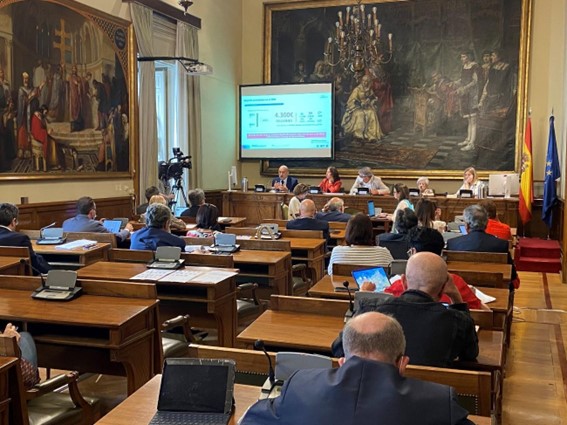Platform for the Prevention of Fractures Due to Osteoporosis (PFO) Presents to Senate Health and Consumption Commission

On May 31st, 2022, the Platform for the Prevention of Osteoporosis Fractures (PFO) was presented to the Spanish Senate Health Commission.
According to the “SCOPE 2021 - A Scorecard for Osteoporosis in Europe” report, 2,945,000 individuals are affected by osteoporosis in Spain and the costs associated with osteoporotic fractures adds up to 4.3 billion euros. This figure is expected to reach 5.5 billion euros by 2030. The number of fragility fractures is expected to increase by 29.6% by 2034.
On May 31st, the Platform for the Prevention of Osteoporosis Fractures (PFO) was presented by three experts in osteoporosis at the Spanish Senate Health Commission meeting: Carmen Sánchez, treasurer of the Spanish Association for Osteoporosis and Osteoarthritis (AECOSAR), presented the burden and consequences of osteoporotic fragility fractures; Dr. Pilar Sáez López, geriatrician at the Fundación de Alcorcón University Hospital, emphasized the lack of awareness and projected economic impact of osteoporosis in a business-as-usual scenario and Dr. José Ramón Caeiro, Head of the Orthopedic Surgery and Traumatology Service of the University Clinical Hospital of Santiago, explained the significant indirect cost of fractures and emphasized the need to prevent fragility fractures as a key component of healthy aging.
The following key points were raised during the session:
- Only 28% of Spanish women receive treatment to prevent fractures in the year following the initial fragility fracture.
- A significant increase in coordination is needed between levels of care.
- Clinical Practice Guidelines need to be developed.
- Four propositions for healthcare, notably Fracture Liaison Services, a Fragility Fracture Code, Orthogeriatric units, and a Fracture registry, are supported by several studies for their effectiveness and need to be further implemented in Spain.
- Political support is needed to combat the economic and socio-health burden of osteoporosis and fragility fractures.
The presentations generated positive responses from representatives of the different Parliamentary Groups:
- Miguel Sánchez López, spokesperson for Health of the Democratic Parliamentary Group (Ciudadanos), thanked and congratulated the work done by the PFO and offered collaboration with his parliamentary group.
- Nerea Ahedo, spokesperson for Health of the Basque Parliamentary Group, said her parliamentary group would study the proposals made by the PFO.
- Antonio Román, Second Vice-Chairman of the Health and Consumer Affairs Commission (Popular Group), thanked the three speakers for their interventions and further reflected on the fact that only 18% of Spanish hospitals have an FLS, which implies inequity in patients' access to proper care.
- Esther Carmona, spokesperson for Health of the Socialist Parliamentary Group, stated that a series of socio-health measures are necessary to deal with fragility fractures, and thus avoid the suffering and dependence of Spanish osteoporosis patients. She expressed the maximum support of her parliamentary group and asked to remain in close contact to make the appropriate follow-up.
The session was closed by Dr. Caeiro, who summarized the urgency of the situation of patients with fragility fractures and the need to implement tools to prevent future fractures. A recording of the session is available here in Spanish.